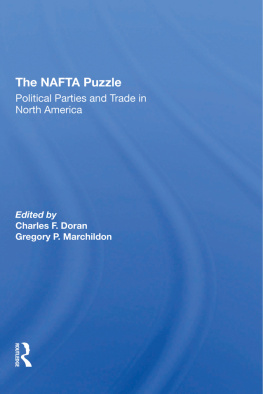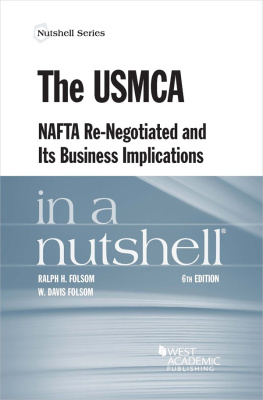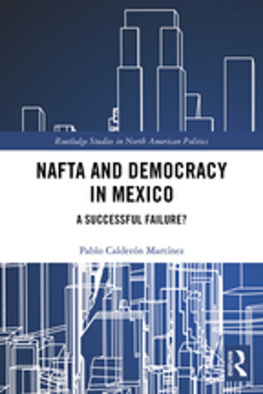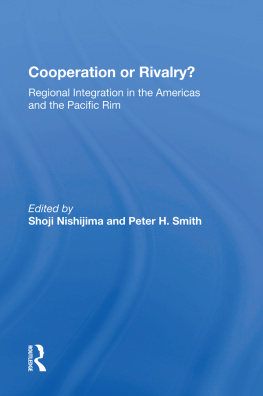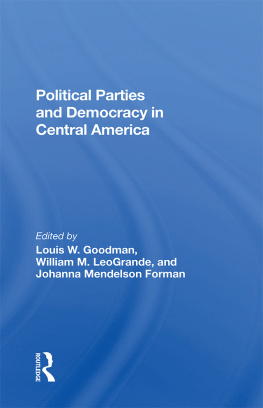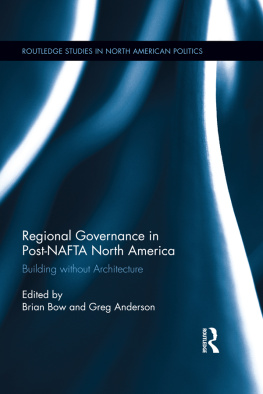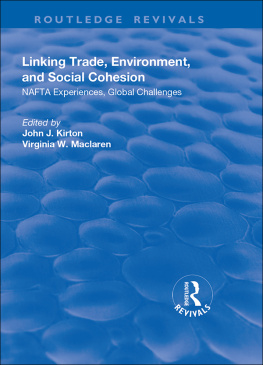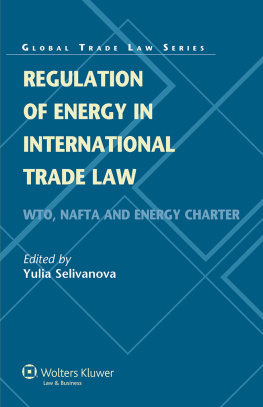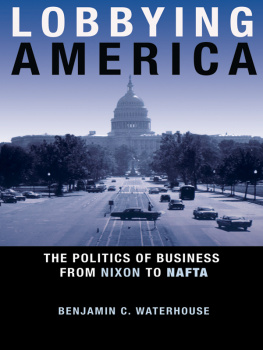First published 1994 by Westview Press
Published 2019 by Routledge
52 Vanderbilt Avenue, New York, NY 10017
2 Park Square, Milton Park, Abingdon, Oxon OX14 4RN
Routledge is an imprint of the Taylor & Francis Group, an informa business
Copyright 1994 by Taylor & Francis
All rights reserved. No part of this book may be reprinted or reproduced or utilised in any form or by any electronic, mechanical, or other means, now known or hereafter invented, including photocopying and recording, or in any information storage or retrieval system, without permission in writing from the publishers.
Notice:
Product or corporate names may be trademarks or registered trademarks, and are used only for identification and explanation without intent to infringe.
Library of Congress Cataloging-in-Publication Data
The NAFTA puzzle: political parties and trade in North America /
edited by Charles F. Doran and Gregory P. Marchildon.
p. cm.
Includes bibliographical references.
ISBN 0-8133-8872-4
1. Free tradeNorth America. 2. North AmericaCommerce.
3. North AmericaCommercial policy. 4. Political partiesNorth
America. I. Doran, Charles F. II. Marchildon, Gregory, 1956- .
HF3211.N34 1994
382'.917dc20 94-10540 CIP
ISBN 13: 978-0-367-29422-9 (hbk)
The editors would like to thank the Donner Foundation, the Draeger Foundation, and the Government of Canada for their timely and generous support of this study. The study was initiated by the editors as part of the research program of the Center of Canadian Studies at the Paul H. Nitze School of Advanced International Studies, The Johns Hopkins University, Washington, D.C., and the emerging affiliated program in North American Studies. Particular appreciation goes to Dr. Barbara G. Doran for the final editing of the entire manuscript. In addition to the individuals acknowledged in each of the chapters, the editors thank those scholars who helped guide the project at various times with constructive criticism and discussion: Tom Barnes, Robert Bothwell, Reuven Brenner, David Calleo, Colin Campbell, Benjamin Ginsberg, Judith Goldstein, Peter Katzenstein, Allan Kornberg, Jonathan Lemco, Seymour Martin Lipset, Charles Lipson, Charles Pearson, Richard Rosecrance, and Sidney Weintraub.
Charles F. Doran
Gregory P. Marchildon
1
Introduction: The Trade and Political Party Flip-Flop
Charles F . Doran
On November 17,1993, a Democratic president passed a Republican initiative on trade and commercial regionalism in North America over the heads of the reluctant members of his own party. Is this the end of political party in the United States? Does this mean that government can make trade policy without taking political party into account? Or is there a more fundamental and complex relationship between trade and political party underlying this result? How, for instance, did each party come to adopt the outlook on free trade that goes with the party label? And when?
Three large puzzles confront the origin of the North American Free Trade Agreement (NAFTA). This book attempts to provide background material necessary to answer these puzzles.
The initial puzzle concerns the reason why the North American trade agreement ever was conceived in the first place. For those who may presently take NAFTA as an article of faith in terms either of its utility or of its inevitability, reference need only be made to the abortive North American Accord idea. Leading candidates in both the Republican and Democratic parties during the 1980 election campaign, including the eventual winner, proposed a far-reaching trade agreement with Canada and Mexico. The idea got nowhere. Indeed, the trade proposal was dropped from the campaign platforms largely because it met an extremely cool response in both Ottawa and Mexico City.
Moreover, as the essays in this volume reveal, North American trade liberalization historically has often experienced a bad reception in each of the three countries. This historical antipathy provides all the more justification for questioning why a regional trade agreement should come into existence. Deep suspicion of U.S. motives often shaped Canadian and Mexican foreign policy toward their larger neighbor, all but ruling out a trade initiative, especially one so restrictive in scope yet so demanding in terms of depth as NAFTA. Under both Diefenbaker and Trudeau, for example, Canada sought a North Atlantic trade pact with Europe to lessen trade dependence upon the United States; and President Salinas of Mexico first sought association with the European Community. For its part, the United States frequently discounted the significance of more formalized trading rules with its two smaller partners.
Strong protectionist lobbies and interest groups operate in each of these polities. At any time in the twentieth century perhaps a majority of the populations could be counted on to oppose free trade. In fact, the historic defeat of the Laurier government (1911) on the issue of free trade with the United States rang in the ears of Canadian government leaders and served to illustrate how few votes trade liberalization was likely to garner for any head of government courageous enough to propose the notion. Thus, alike for policy-maker and analyst, the puzzle concerning why NAFTA happened, why in the early 1990s and why in this format, remains a mystery worth examining.
A second puzzle, cutting in something of the opposite direction to the first, is why in the spring and summer of 1993 NAFTA began to run aground politically. What slowed its advancement, and why of all places did this loss of momentum occur in the United States? The two longstanding opponents to regional free trade, Mexico and Canada, had already put in place the legislation to make the agreement reality. A measure of the lack of anticipation for U.S. recalcitrance was the way the treaty had been drafted. According to the treaty, if one of the partners dropped outand the architects had in mind Canada because of the unpopularity of further regional free trade agreements there beyond the highly criticized Canada-U.S. Free Trade Agreement (FTA)the other two partners could go ahead with the arrangement. Without the United States, the agreement made no sense. Little did anyone suspect that the United States, the principal partner to the agreement, would be the country with "the coldest feet."
Arguments against the treaty discussed in the United States were easily enough identified. Environmental fears of a "pollution haven" in Mexico for foreign and U.S.-based industry on the one hand, and "unfair labor practices" linked to child-labor, unsatisfactory working conditions, and low wages on the other, were the most commonly asserted complaints. Behind these complaints lay the deeper anxiety of loss of U.S. jobs to Mexican industry. But what makes these "explanations" unsatisfactory is the fact that corresponding anxieties could be heard, and were heard, in both Mexico and Canada, albeit with slightly different slants. At base, the same refrain in each country was trepidation over "investment diversion" and "trade diversion." Was this consternation more severe in the United States than in Canada or Mexico? To assume so automatically, because the United States became the laggard in signing the treaty, is potentially a mistake of causal inference. Deeper structural differences between the governments may be at work. Similarly, the arguments of tactical timing inside the Clinton agenda can be overplayed as to explanation, since the issue of timing was more a response to a difficult situation than itself a cause.


